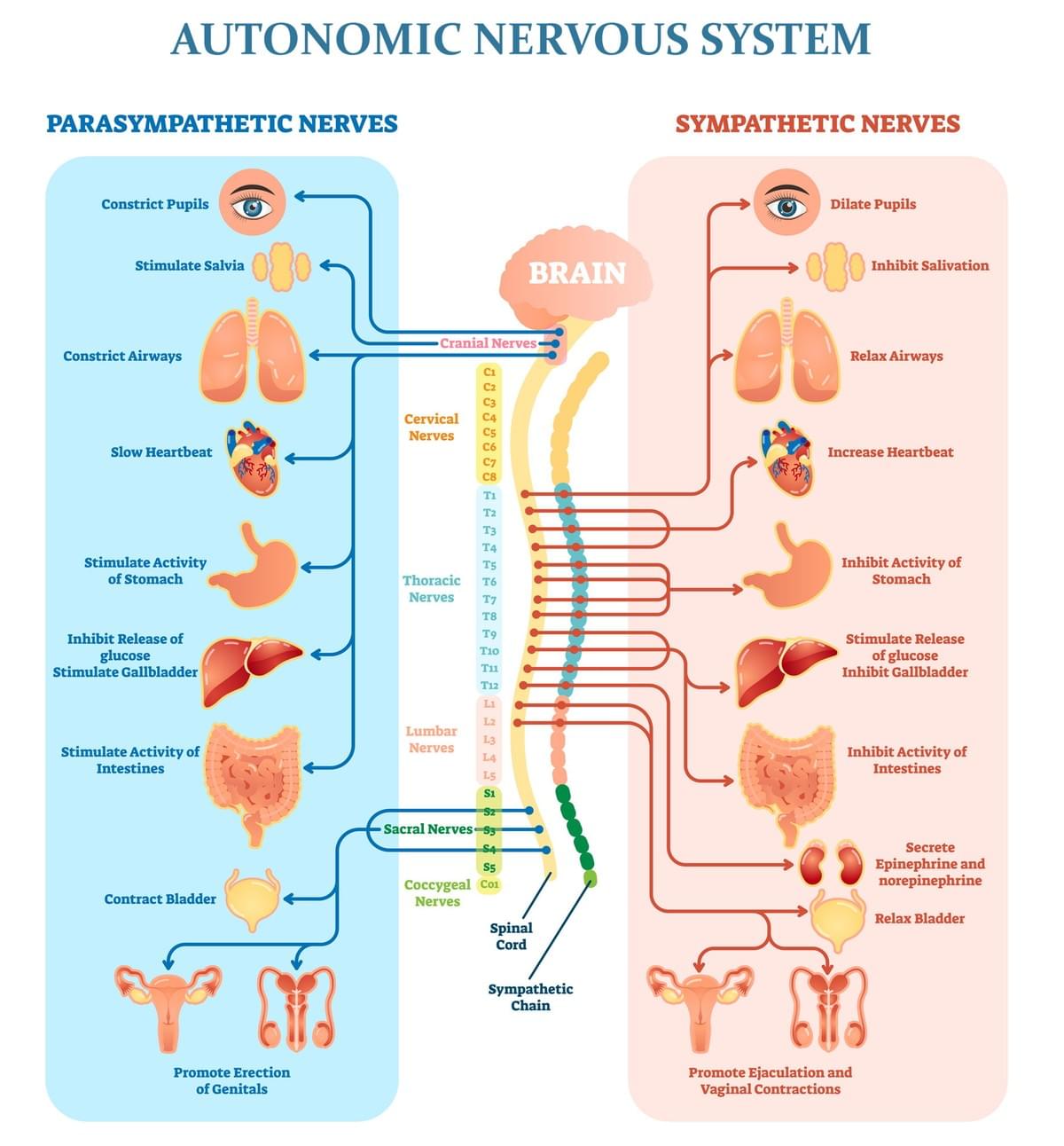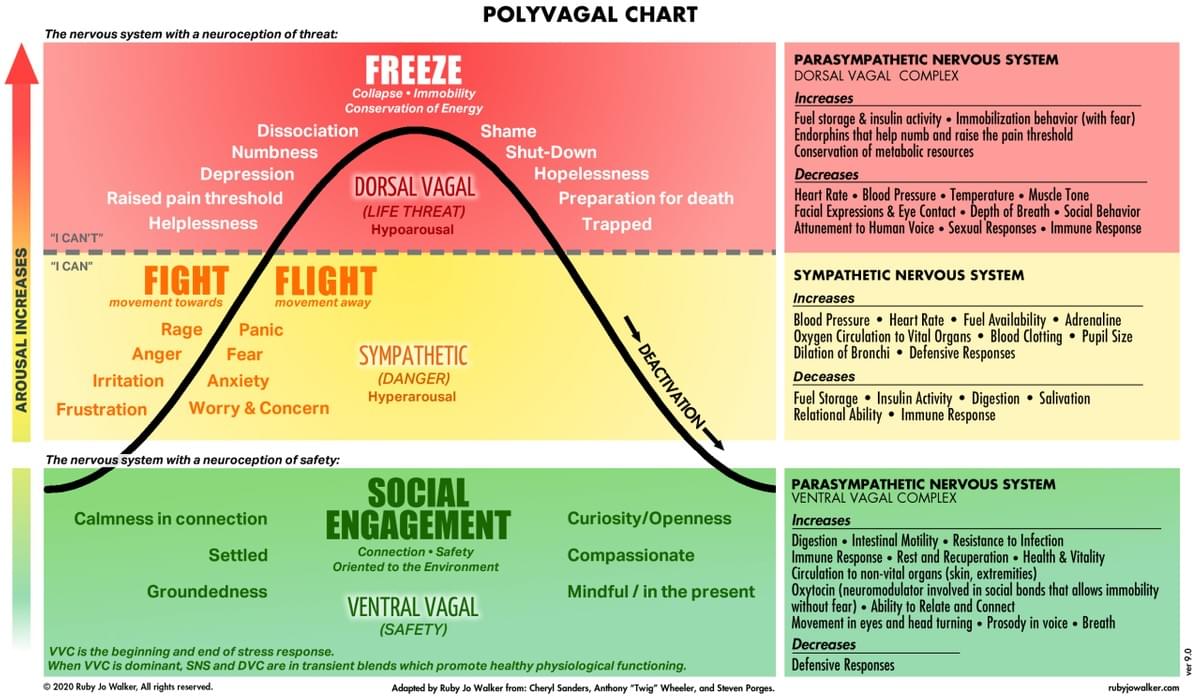Understanding the nervous system, one of the primary ways our bodies perceive and respond to the world around us, is key to grasping how our bodies and minds are operating. It has helped me personally to better care for some of the health conditions and mental states I have grappled with, like anxiety, depression, Irritable Bowel Syndrome, and chronic pain.
Here are some basic terms and metaphors to help you understand what the Vagus Nerve and Polyvagal Theory is and how they work:
Your Vagus Nerve is your 10th cranial nerve ("vagus" comes from a latin root meaning "wandering"), and is the primary information highway between your brain and your heart, lungs, digestive system, throat and parts of your face, among other things. Its main role is to help regulate activating and calming responses so that your body knows how to delegate resources and energy to both survive and thrive. Increasing our Vagal Tone means improving how well we can adapt, flow and balance these responses.
No sense in digesting lunch if your life is in danger.
You may have heard of the sympathetic autonomic nervous system ("fight or flight" activating stress response), and parasympatheic autonomic nervous system ("rest and digest" relaxation and life-sustaining response). We are always utilizing both at the same time, to constantly adapt and function in our day-to-day lives, in the same way that you need both your gas and brake pedals to drive your car. Our nervous system state also becomes the lens through which we see and interpret the world around us.

"The only problematic nervous system state is the one you get stuck in."
-Jonny Miller, teacher of Nervous System Mastery course, also to credit for the car metaphor shared here.
Your sympathetic nervous system response (acceleration/gas pedal) is often thought of as "fight or flight" but is any activation in the face of stress, threat, or need for heightened activity (anything from a work deadline, to crossing the street in traffic, to running from a tiger). This response includes things like increasing your heartbeat, breath, blood pressure and core body temperature, diverting resources away from digestion (not a priority when you're trying to survive).
Your parasympathetic nervous system (slowing down/brake) is often thought of as "rest and digest" and this response includes things like slowing your heartbeat and breath, lowering blood pressure and body temperature, and widening your field of vision (literally your eyes, and also enabling mental big picture perspective) and healthy digestion.
"The vagus nerve is the main neural component of the parasympathetic nervous system. It automatically controls parasympathetic motor functions of the heart, lungs, digestive system, liver, gallbladder, spleen, pancreas, and kidneys. This means that the vagus nerve has the very important job of stimulating the “rest and digest” functions of these organs." -Sarah Warren of The Somatic Movement Center.
Stephen Porges, an American psychologist and neuroscientist, proposed the Polyvagal Theory in 1994, which linked the evolution of the mammalian autonomic nervous system to social behavoir, and expands our understanding of the parasympatheic nervous system further into two facets:
The first is called Ventral Vagal (think of this as your car's foot brake), and is sometimes called "tend and befriend" because it is primarily socially cued by being in nourishing connection with others and feeling like we belong. Remember, we evolved as social, group-dependent creatures! Thus our bodies rely on cues and connection with other humans to feel safe enough to be at ease and allow the heart, lungs, face, throat, and digestive system to function in service to nourishing us and our physical well-being.
The second is Dorsal Vagal (think of this as your car's emergency brake) and is sometimes called the "freeze" or immobilization response. It's the shut down switch for when we're feeling too much pain, overwhelm, or stress for too long. When in full dorsal response, it can manifest as burn out, dissociation, depression, deep lethargy, lack of motivation, or collapse. This evolved as a way to cope with extreme or prolonged pain and stress. The dorsal response, small doses however, can be very helpful for navigating our complex human lives—often utilized when we meditate, sleep at night, or hold ourselves back from angry outbursts at work.
Unlike in a car though, all three of these states operate continuously in parallel to regulate our bodies and minds throughout the day. For examples, a play or flow state is Ventral Vagal sense of connection + sympathetic activation. A deep rest state (as you typically enter when sleeping well, or receiving wonderful bodywork) often experienced is Ventral Vagal sense of connection/belonging/safety + Dorsal Vagal shut down.
Chronic stress, pain, and trauma, and the increased loneliness that pervades our modern lifestyles and culture can really disrupt our normal ability to flow from one nervous system state to another. Peter Levine's work on Somatic Experiencing and trauma has largely grown out of Polyvagal Theory.
You can probably start to understand the challenge we face as modern humans, and what it's doing to us personally and culturally to live in a time that has normalized—and even glorified—working long intense hours under high stress, as well as seeing/hearing sensationalized stories, violence, and stressful situations in our media. To live in a culture of More, Bigger, Better, Louder, Saltier, Spicier, etc.
As creatures that primarily self-regulate based on what and who is around us, it is of utmost importance that we learn to pay attention to this level of our human biology, to give and create for ourselves experiences that help us have more ease, strength, resilience and adaptability. I appreciate Polyvagal Theory for the way it helps bridge our understanding of the body-mind connection, and offers tools for self-regulation (more on this to come).
It's a big reason why getting bodywork is so therapeutic. It's why finding friends and community where you feel seen and heard is so important. It's why exploring and experiencing the subtle is so radical. It empowers you to sense for yourself, to self-regulate, to respond to your life from a grounded and centered state, to thrive with less and enjoy the world around you, instead of always feeling like you need more.

